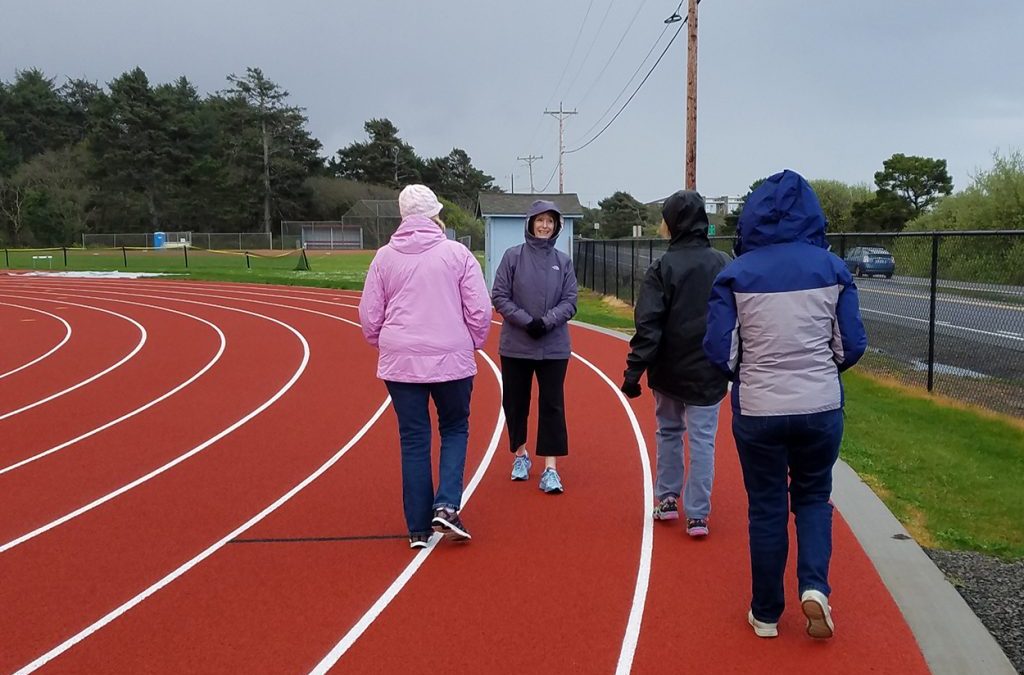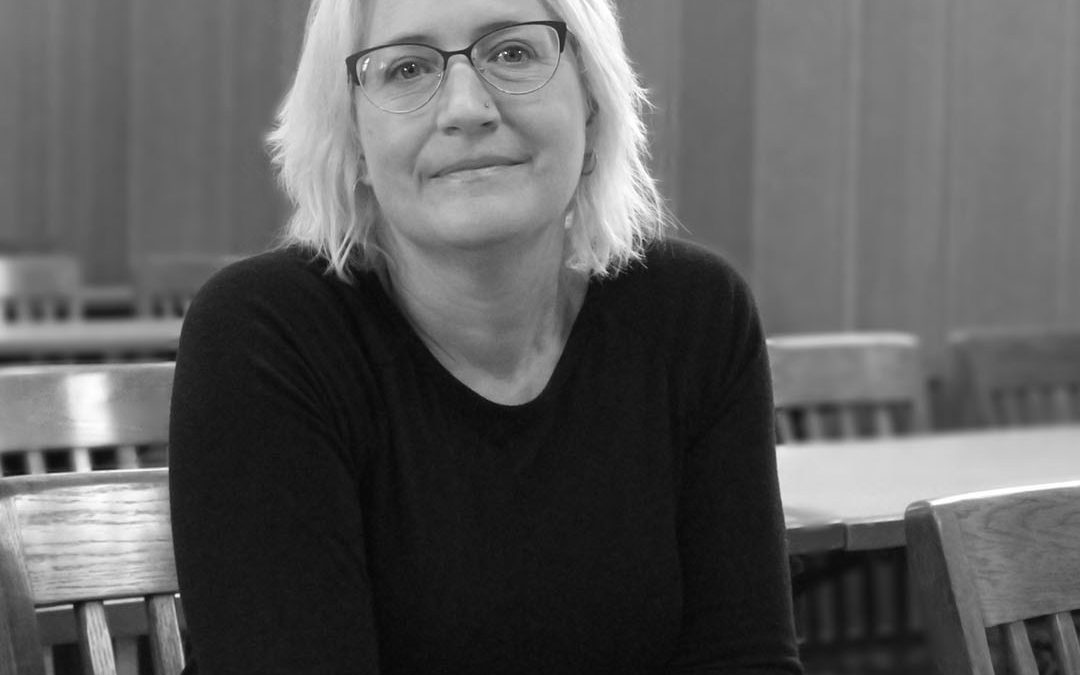
by Guest | Dec 19, 2019 | Being Well
By: Terra Marzano, Licensed Clinical Social Worker at Rinehart Clinic
Despite our recent sunshine, Winter is here and 2020 is upon us. Having gotten through Thanksgiving, we are now inundated with gift guides, office parties, family gatherings and the inevitable subject of New Year’s Resolutions. For many of us, the concept of New Year’s Resolutions is uninspiring and can bring out a sense of failure from past resolutions. How do we turn this around? How can we use the calendar as a spark for growth and change? By shifting our perspective slightly, we can create a new plan for the coming year.
- Set an intention for the year by focusing on a word or phrase that captures the spirit of the change you are pursuing. “Contentment” can be gentle a way to stay grounded in our spending habits, “Curiosity” can encourage us to be more exploratory about our world and the people around us, “Why Not?” can help us step out of our comfort zone and be open to new experiences.
- Gather support by sharing your intention and goals with loved ones, friends, your therapist, or an on-line community. Does your resolution include more movement? Join a class at NCRD or the YMCA, meet a friend to walk the track, tell your spouse you’re going to walk the stairs at home a bit more for exercise, or ask someone to text you weekly to check-in. A bit of support goes a long way towards helping us all make lifestyle changes.
- Start small with weekly, actionable goals in order to ensure your efforts are sustainable. If you intend to move more in 2020, start with 5-minutes of activity 2 times per week and see how that feels. As the weeks pass, you may feel strong enough to walk a bit further or add a stretching routine. The key is to break your goal into smaller, attainable steps.
- If you intend to eliminate an unhealthy habit, such as nicotine use, add in a supportive habit. If, for example, your weekly goal is to cut-out a morning cigarette, add-in a different habit: drink a cup of herbal tea, take a brisk walk, spend 5 minutes writing a gratitude list, brush and floss your teeth, step outside to breathe fresh air.
- There’s no reason to wait until January 1st to create change: you can start now! And just as you can start now, you can start and restart every day. Sustained change often requires starts and restarts, resetting our intentions and adjusting our action plans. We can restart every single day.
As we look ahead to the new year and 2020 resolutions, notice any unhelpful rigidity around your goals and see if you can soften your approach. Many of our habits have been in place for years and it will take time to create change that lasts. It can be helpful to explore your resolutions through writing and, as you do, see what themes emerge that can inspire your intention for the new year.
No matter what goals you set, and even if you have to start over a few times before you reach them, it’s that first step of wanting to make positive change that’s important, whether it’s a resolution for the New Year, or a change for the better any time throughout the year.
For more local health and wellness information, follow Tillamook County Wellness on Facebook, Instagram and Twitter.

by Guest | Dec 11, 2019 | Being Well, Work Well
By: Sydney J. Elliott, MFA, SydneyJElliott.com
Ten or twenty years ago, I would have never imagined myself sitting cross legged in front of a makeshift altar of sorts. On it are pictures of my dog I recently lost, a candle, some sort of crystal, a cup of coffee, and a deck of cards with inspirational messages printed on them. My obese, other-abled cat pushes open the door and flops down beside me as I draw a card, read the day’s message, and light the candle. Then I sit. And do nothing but breathe for five to ten minutes, sometimes stretching a little. Then I blow out the candle, try to take one word from the message to revisit during the day, and leave the space in the search for more coffee. My day can start now.
During the holidays, it’s easy to let the small rituals of self-care slip. Our schedules are usually more hectic, and we often are pulled in many directions while still having to work, take care of our families, and navigate the chaos of the holiday season. But having a daily ritual can provide us with a cornerstone to get through our day.
The ritual doesn’t have to be elaborate. It can be writing before the household wakes up, doing yoga, walking the dog, or anything that fits your lifestyle. It can be anything that nourishes you in some way, a small gesture or action that becomes a healthy habit of self-care and self-recognition.
And rituals do not necessarily mean being alone. Maybe you go to an exercise class on a regular basis or go to church on Sunday. The main take away is not to stop, especially when it’s easy to when we are rushing through the holiday months.
If you don’t have a ritual or daily habit that nourishes you, set an intention to start one. Take a “forest bath” every morning, write, meditate, do artwork, knit, color, or anything that is not interrupted by distraction, and something that is just for you.
You don’t need an altar or crystals. All you need is ten minutes dedicated to quieting your mind. The physical benefits are a bonus as well.
It might be difficult to make the commitment and get started, but once you have it as part of your daily routine, you won’t want to let it go. If you have a daily ritual, keep doing it, especially during this time of year. If you don’t, give it a try. You are worth the time.

For more local health and wellness information follow Tillamook County Wellness on Facebook, Instagram and Twitter.
If you are looking for a place or community where you can start or continue your self-care practices, consider attending FREE weekly yoga classes taught by Sydney Elliott, Monday and Wednesday 12:00 – 1:00 pm. Class will start the first Monday of Winter Term 01/06/2020 at Tillamook Bay Community College, and is for all skill levels! You may also visit Sydney’s website at SydneyJElliott.com to learn more about her background in writing, editing, and various yoga practices.

by Shelby | Dec 5, 2019 | Being Well
We are fortunate to live in a community that has grown and supported each other over the years. Charitable donations and time spent volunteering play a significant role in our state and county. In fact, the Giving in Oregon Guide reports that in 2014 Oregonians donated 2.28% of their adjusted gross income, and in Tillamook county the total contribution was $3,712,349 to charitable causes. These resources go a long way to helping local non-profits provide services that enhance the well-being of our residents. While many nonprofit organizations rely on donations of time and monetary value, it turns out that research shows making charitable donations and volunteering has significant health benefits for the donor as well!
According to a study published in the BMC Public Health Journal, health benefits of volunteering include better mental and physical health, an increase in life satisfaction and happiness, and lower symptoms of depression. In addition, the Cleveland Clinic notes decrease in blood pressure and an increase in life expectancy as related health benefits to giving. Along with health benefits, volunteering and making donations also creates a larger sense of self, an increased feeling of belonging to your community through your charitable efforts.
Be on the lookout for the annual Tillamook County Giving Guide – a guide to support our local nonprofits and keep supporting our community! When available, you can locate the giving guide on the Tillamook County Pioneer website at www.tillamookcountypioneer.net.
For more local health and wellness information follow Tillamook County Wellness on Facebook, Instagram and Twitter.
# # #

by Guest | Nov 27, 2019 | Being Well
By Tonya Brown SRCH Colorectal Cancer Screening Coordinator and Care Oregon Panel Coordinator
Do you only go to the doctor’s office when you are sick or injured? When was the last time that you had your blood pressure checked?
An annual well exam with your primary care provider is the ideal way to get whole-person care all at one time and it is important for people of all ages! Not only does it allow you the opportunity to check in with your provider when you are feeling good, it allows your provider to know your normal baseline so that they have something to compare to when you are truly sick.
An annual well exam will address all body parts and systems, not just one or two that are causing problems when you go to your provider for a “sick” or problem visit. They are going to address your physical, mental, and emotional health, as well as perform many other preventive screenings, including blood work.
Screenings are a way to make sure that you are staying healthy. Some of the screenings that may be done include oral, hearing, and eyesight tests. Your provider may draw blood to check your cholesterol, blood sugar levels, as well as blood count and other tests. They may refer you for further cancer screenings as well, for instance, mammograms, or a colonoscopy. They check all of you to make sure you are well and have the best possible chance of staying well!
They may recommend that you go to a specialist for care, these specialty providers are there to help you achieve your health goals. They specialize in areas that primary care providers do not. You, your primary care provider and specialist work together to create a path to wellness with your best health being the main goal. We have all heard the saying, “it takes a village to raise one child,” and that applies to healthcare as well. It takes a village to treat the whole person and not just a symptom you may be having. A team-based approach to preventive care can also connect you to other important resources to support lifestyle change.
Going to your provider yearly, helps lower healthcare costs, preventing disease before it starts. It also gives early access to treatment if something comes up, resulting in better health outcomes. By having a relationship with your primary care provider, you are more likely to ask questions, consider their opinion, and follow their advice.
So, if you have not seen your provider for an annual health exam yet this year, call them today and schedule one. They love to see you when you are well even more than when you are sick!
For more local health and wellness information follow Tillamook County Wellness on Facebook, Instagram and Twitter.

by Shelby | Nov 20, 2019 | Being Well
The American Cancer Society reports that 34 million Americans still smoke cigarettes, and smoking remains the single largest preventable cause of death and illness in the world. The estimated smoking related deaths every year is 480,000, or nearly 1 in 5 deaths, and over 16 million Americans live with a smoking-related disease. Quitting tobacco may not be easy. If you are thinking about it, or even ready to do so, setting a quit date may serve as your first step. November 21st is annual “The Great American Smokeout,” by choosing this date as your quit date, you will join thousands from all across the country in taking an important step toward a healthier life and reducing your cancer and chronic disease risk.
Quitting smoking improves health immediately at any age. According to the CDC, smoking is a risk factor for type 2 diabetes, and makes your diabetes – any type, harder to control. In fact, the CDC further reports, smokers are 30–40% more likely to develop type 2 diabetes than nonsmokers. The more you smoke; more you are at risk of developing type 2 diabetes.
You don’t have to stop smoking in one day or do it alone. Start with day one, and know there are resources available to support you, such as counseling and medications. It can often take multiple attempts to successfully quit tobacco use. Speak with your primary care doctor or for free help, call 1-800-QUIT-NOW, and visit quitnow.net/Oregon.
If you are a support person to someone who is trying to quit, you may also find some helpful “Do’s and Don’ts” at https://www.cancer.org/healthy/stay-away-from-tobacco/helping-a-smoker-quit.html.
For more local health and wellness information, follow Tillamook County Wellness on Facebook, Instagram and Twitter.

by Guest | Nov 7, 2019 | Being Well
November is National Diabetes Awareness month. Tillamook County Wellness is all about “Making Healthy Happen” – We are on a mission to prevent type 2 diabetes and support people in managing their disease if already diagnosed.
Annual visits to your healthcare provider are the best way to find out if you are at risk and to learn what steps you can take to improve your health. This is also the time of the year when most insurance plans are nearing annual renewal for coverage so it’s a perfect time to schedule a yearly wellness exam, a service that is covered in full by most insurance plans.
Our Wellness partners at Tillamook County Community Health Centers, Adventist Health, and the Rinehart Clinic all offer preventive health screenings throughout the county. To make healthy happen in your life, schedule a visit with your primary care provider or establish care with one of our local providers:
Adventist Health – Tillamook
Tillamook Medical Plaza
1100 Third Street, Tillamook, OR 97141
(503) 842-4444
Pacific City Medical Office
38505 Brooten Road, Pacific City, OR 97130
(503) 965-6555
Manzanita Medical Office
10445 Neahkahnie Creek Rd, Manzanita, OR 97130
(503) 368-6244
Women’s & Family
1011 Third Street, Tillamook, OR 97141
(503) 815-2100
Rinehart Clinic
230 Rowe Street, Wheeler, OR 97147
(800) 368-5182
Tillamook County Community Health Centers
Central County Health Center
801 Pacific Avenue, Tillamook, OR 97141
(503) 842-3900
North County Health Center
276 South Hwy 101, Rockaway Beach, OR 97136
(503) 355-2700
Mobile Clinic – Coming Soon!
Medical, Dental and Behavioral Health Services
Annual Diabetes & You Seminar November 12th
In support of this special month, Adventist Health Tillamook and the Tillamook County Diabetes Coalition, is sponsoring their “Diabetes and You” Annual Seminar on Tuesday, November 12th from 9:15 a.m. to 3:00 p.m. at the Tillamook Seventh-Day Adventist Church lower level conference room.
Adventist Health Tillamook and the Tillamook County Diabetes Coalition have gathered an informative line-up of speakers, including Jennifer Hedden, MD; Shelyna Thawer-Rice, NP; and Dusti Linnell, PhD. The speakers will discuss topics such as Latent Autoimmune Diabetes in Adults, Understanding Your Gut Microbiome, and Diabetes and Kidney Health. The event includes information on how to include more movement in your life for better health and how to prepare healthy food. A delicious heart-healthy lunch is included.
In less than 30 years it is projected that 1 in 3 Americans will have diabetes. The diagnosis of diabetes carries increased risk for several serious complications: heart disease, stroke, kidney disease and blindness, just to name a few. Being diagnosed with diabetes doesn’t mean you will experience these health complications, but it does increase your risk for them significantly. Come learn about the lifestyle changes that can help prevent or even turn around this diagnosis at this fun and inspiring event. For more information or to RSVP contact Sue Phillips-Meyer at 503-815-2443 or susan.phiilips-meyer@ah.org.
For more local health and wellness information, follow Tillamook County Wellness on Facebook, Instagram and Twitter.







